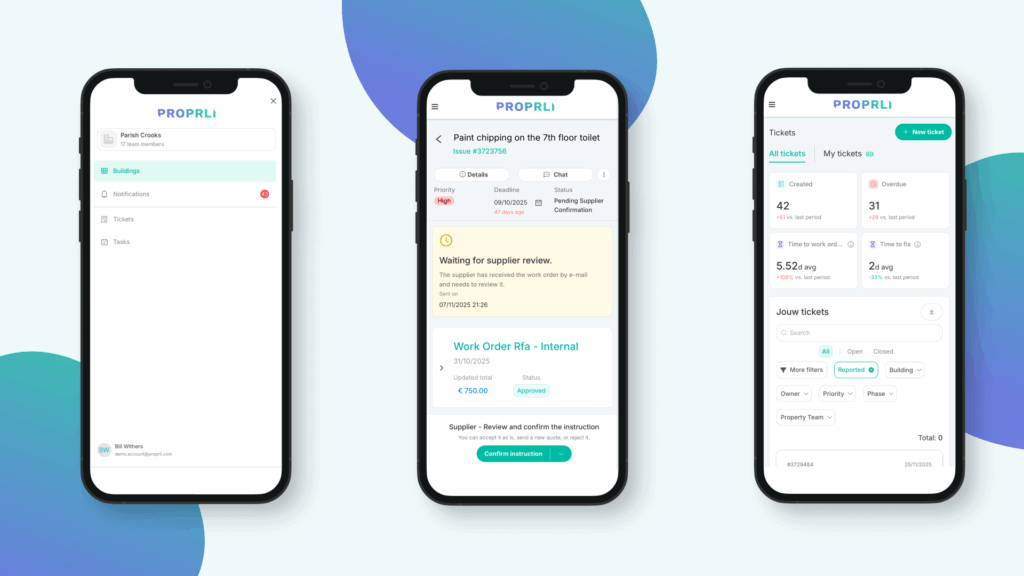As a modern property manager, you’re well aware that the real estate industry is as much about brick-and-mortar properties as it is about paperwork. Effective real estate document management has become a cornerstone of property management, ensuring that everything from leases to land assessments is accurately organized and readily accessible. Gone are the days of towering file cabinets and overstuffed folders; you’re now operating in a digital era where paperwork organization is streamlined for efficiency and security. It’s time to embrace the digital solutions that enable you to manage documents with ease and protect the critical information within your care.
Key Takeaways
- Discover how digital tools can transform your property management workflow.
- Explore the benefits of transitioning to a paperless environment for a more organized office.
- Understand the importance of securing your digital documents to protect sensitive data.
- Learn about the convenience that immediate access to digital documents brings to your day-to-day operations.
- Recognize the efficiency gains and customer service improvements inherent in modern real estate document management systems.
The Fundamentals of Real Estate Document Management
Embarking on the digital transformation journey can significantly streamline how you manage property document storage. Document management in real estate is not only about keeping files organized; it plays a crucial role in statutory compliance, providing evidence of transactions, and aiding in dispute resolution.
Real estate document management acts as the backbone of efficient property management, skillfully balancing the logistical demands of the modern real estate landscape. Your embrace of digital tools tasked with securing digital records speaks volumes about your dedication to adapting and thriving in an ever-evolving industry. These systems not only safeguard the data but also streamline management processes, ensuring that both you and your clients experience the highest service standards.
Understanding Real Estate Development Document Management
The complexity of real estate development involves a myriad of essential real estate documents. Accurately managing these records ensures that every phase of property management is documented, from initial acquisition to eventual sale or lease. Robust document management systems serve as the backbone, promoting due diligence and clarity across all operations.
Essential Documents for Property Management
Property management relies heavily on an array of documents, such as lease agreements, inspection reports, and maintenance logs. Keeping these essential documents readily accessible aids in transparent dealings with tenants, contractors, and other stakeholders. Good document management practices ensure that crucial paperwork is never misplaced or lost, providing peace of mind and legal protection.
Transition from Physical Filing to Digital Solutions
The shift from traditional filing cabinets to digital solutions marks a significant milestone in property management. Digital platforms come with advantages like enhanced security, improved searchability, and disaster recovery options. These systems advocate a paperless environment, substantially reducing storage space and enabling secure, cloud-based access to important files.
- Efficient tracking and retrieval of documents
- Streamlined collaboration between stakeholders
- Advanced search capabilities for large volumes of data
- Heightened security measures for sensitive information
Adopting digital methods for property document storage not only caters to the growing needs of real estate professionals but also aligns perfectly with the fast-paced, technology-driven world where quick access to information is a necessity for success.
Key Features of Digital Real Estate Documents Systems
As you venture into modern property management, embracing a real estate document system with robust file search capabilities and data security features is imperative. The transition to digital real estate documents will not only revolutionize the way you organize and access your files but will also secure your data like never before. Let’s explore the fundamental features that these systems offer.
- Advanced Search Options: With keyword and date-based file search capabilities, you’ll find what you need in seconds, not hours.
- Password Protection: Manage who can view or edit documents by setting up restricted access controls.
- Audit Trails: Keep track of changes with detailed histories of document edits and access.
- Disaster Recovery: Put your mind at ease with tools designed for document backup and restoration.
- Auto-Cleanup Functions: Enable your system to automatically sort and delete outdated documents, keeping your files current without manual effort.
- Mobile Accessibility: Access your real estate documents anytime, anywhere, increasing your productivity on the go.
These features not only streamline your workflow but also fortify your document handling with essential data security features. By modernizing your approach, your real estate business will benefit from reduced manual entry errors and a significant enhancement in operational efficiency.
| Feature | Description | Benefits |
|---|---|---|
| Keyword & Date Search | Finding documents is made effortless with intuitive search functionalities. | Enhances efficiency and saves time. |
| Access Controls | Documents are secured with customizable user permissions. | Prevents unauthorized access and ensures data privacy. |
| Edit Histories | Full visibility into document changes and access patterns. | Offers transparency and aids in regulatory compliance. |
| Automatic Sorting and Deletion | Keeps digital storage clean and relevant with minimal input required. | Reduces clutter and enhances document management. |
| Mobile Access | Documents are accessible on various devices, not just desktop systems. | Provides convenience and flexibility for property managers on the move. |
By integrating a comprehensive real estate document system into your operations, you position your business at the forefront of the industry, ready to handle the ever-evolving demands of property management with aplomb.
Implementing Property Document Storage Strategies
As a real estate professional, choosing the right property document storage strategies is crucial for the security and accessibility of your important files. Let’s consider the available options and determine the best solution for your needs.
On-Site vs Cloud-Based Document Management
When it comes to storing property documents, you have two primary options: on-site storage and cloud-based document management. On-site storage might seem like a familiar choice, allowing you to have physical control over your documents. However, it can be risky given the potential for hardware failures or disasters that could compromise your documents’ safety. Cloud-based document management, on the other hand, offers a more resilient and accessible solution.
| Aspect | On-Site Storage | Cloud-Based Management |
|---|---|---|
| Initial Cost | Higher due to physical hardware | Lower with subscription models |
| Maintenance | Requires ongoing IT support | Handled by the service provider |
| Security | Dependent on local measures | Advanced encryption and security protocols |
| Accessibility | Limited to physical location | Accessible from any place, at any time |
| Disaster Recovery | Potentially compromised | Enhanced through redundancy systems |
Securing Your Digital Documents
Secure document storage should be at the forefront of your strategy. You want to keep sensitive data, like leases and tenant information, safe from unauthorized access. Employing robust security protocols such as data encryption and multi-factor authentication can provide the peace of mind that you, and your tenants, deserve.
Accessibility and Recovery Protocols
Should an unpredictable event occur, having reliable accessibility and recovery protocols in place is essential. These protocols ensure you’re able to maintain compliance, swiftly respond to audit requests, and prevent data loss—one of the critical advantages of cloud-based document management systems.
Ultimately, your choice between on-site storage and cloud-based solutions will influence the efficiency and resilience of your real estate operations. Consider the comparison and security aspects as you implement the property document storage strategy that best fits your business model.
Maximizing Efficiency with Document Tracking Software
As a forward-thinking property manager, you’re constantly seeking ways to enhance your operations, and integrating document tracking software is a game-changer. It’s not just about keeping tabs on paperwork; it’s about revolutionizing how you handle data management and risk mitigation, while simultaneously amplifying property management efficiency.
Streamlining Data Management and Risk Mitigation
Imagine having all your critical documents—tenant agreements, maintenance workflows, and compliance papers—neatly organized in one centralized location. This seamless organization not only sharpens efficiency by slashing the time taken to retrieve information but also plays a pivotal role in reducing potential errors. Moreover, such meticulous data management serves as the backbone for reducing legal liabilities, as every document is tracked and accounted for, mitigating the risks linked with mismanagement or loss of sensitive documents.
Improving Property Managers’ Response Times
Responsive interactions are the lifeline of thriving property management. With cutting-edge document tracking software, every query or urgent requirement gets a swift turnaround, leaving tenants and stakeholders with a positive impression of your firm’s responsiveness. This speed is owed to the streamlined access to documents, fostering a proactive rather than reactive work culture.
Enhancing Collaboration and Delegation
Collaboration is the cornerstone of high-functioning teams, and with real-time access to documents, your team can work together like a well-oiled machine. Delegation becomes simpler as specific documents can be assigned and tracked, ensuring accountability and boosting overall team productivity. The environment this creates is one where management flows, tasks are completed in sync, and property management becomes not just a job but a symphony of efficiency and precision.
By adopting such robust document tracking software, you not only prime your property management business for scaling and expansion but also establish a resilient foundation that withstands the test of a fast-paced real estate landscape. It’s not just an upgrade; it’s a transformation towards peak management efficiency.
Real Estate File Organization for Optimal Operations
As a real estate professional, ensuring efficient operations in your day-to-day schedule means having a reliable real estate file organization system in place. Effective organization not only aids in maintaining order but also boosts productivity by reducing the time spent hunting for documents. By embracing document centralization, you gain a panoramic view of all property management activities, which smoothens task execution, including tenant background checks and maintaining service requests.
Data accessibility is another critical aspect of property management. With the appropriate digital tools, you can swiftly access rent payments, inspection reports, and agreements, facilitating on-the-spot decision-making and superior tenant services. Let’s break down the structure of an organized real estate file system with a simple table:
| Document Type | Description | Location |
|---|---|---|
| Lease Agreements | Official rental contracts and addenda | Centralized digital repository |
| Maintenance Requests | Records of repair and maintenance activities | Online service request system |
| Tenant Screening Reports | Background checks and credit assessments | Secured access database |
| Vendor Contracts | Signed agreements with service providers | Contract management platform |
| Financial Reports | Rent roll, income, and expense statements | Integrated accounting software |
Centralizing documents in a digital format not only allows for easy retrieval but also plays an essential role in risk management and compliance. Your files are safe and backed up, ready for you whenever needed, and from any device with proper credentials. It is a step towards a full-proof operational protocol that ensures your real estate business runs like a well-oiled machine.
Remember, efficiency in the real estate industry doesn’t just come from being busy; it comes from being organized. By securing a system that supports document centralization and promotes data accessibility, your real estate endeavors can scale new heights of productivity and service quality.
Benefits of a Secure Property Document Storage System
When it comes to managing your real estate operations, the significance of having a secure property document storage system cannot be overstated. It doesn’t just protect your files; it also propels your business forward in terms of efficiency and reliability. Let’s delve into the particulars and discover the essential advantages such a system provides.
Promoting Data Integrity and Security
At the core of a sound document storage system is the commitment to data integrity. By putting in place stringent security measures, you can protect crucial data from unauthorized access and potential breaches. Relying on encryption and careful user permissions, your sensitive documents remain safeguarded, keeping your client’s data safe and your business operations secure.
Securing digital records within the realms of real estate document management is not just an operational upgrade, but a strategic asset that propels you ahead in the competitive tide. With robust cloud-based solutions at the helm, maintaining impeccable records becomes not just a necessity but a seamless part of your daily workflow. By integrating these practices, your role as a property manager is not just elevated but transformed, setting a new benchmark for excellence and client satisfaction.
Boosting Productivity with Quick Data Retrieval
Every second counts in real estate management, and having the capability for quick data retrieval is akin to having a superpower. Instantly access lease agreements, financial records, and historical client information, minimizing downtime and maximizing your productivity. This speed of access ensures that your operations never skip a beat, and you’re always ready to meet your clients’ needs promptly.
Supporting Client Confidentiality and Trust
Maintaining client confidentiality is not just an ethical mandate; it’s a cornerstone of building trust. Secure storage systems provide peace of mind for both you and your clients, knowing that their confidential information is stored with the utmost security. This trust is integral in fortifying the professional reputation of your property management firm.
Below is a quick comparison of the characteristics and benefits of implementing a secure storage system:
| Feature | Benefit |
|---|---|
| Data Encryption | Ensures that sensitive information is transmitted and stored securely, mitigating risk of data breaches. |
| User Permissions | Limits document access to authorized personnel, enhancing operational security. |
| Quick Search Capability | Reduces the time taken to find documents, thus increasing efficiency for property managers. |
| Real-time Access | Enables immediate response to client queries and streamlines property management tasks. |
| Client Data Protection | Promotes trust and confidentiality, key for long-term client relationships. |
Selecting the Right Real Estate Document System
Finding an ideal real estate document system can be pivotal for the agile and responsive management of your property portfolio. It’s about aligning your operation’s unique requirements with the capabilities of a powerful management platform. Consider not only the present needs but also future ambitions as the business landscape evolves.
Criteria for Evaluating Management Platforms
Embarking on management platform evaluation involves a meticulous look at the system’s performance in real-time use, its capacity to integrate seamlessly with your existing operations, and how well it aligns with your strategic goals. Assessing its data management efficiency, user accessibility, and vendor support are essential steps in this decision-making process.
Customization to Suit Business Needs
The most effective document systems offer extensive system customization options. Whether it’s tailoring dashboards to present the most relevant information or adjusting how data is entered and stored, these personal touches can enhance productivity and ensure that the system complements your workflow.
Scalability and Growth Considerations
As your real estate portfolio grows, so should your document management capabilities. Scalability is a feature that cannot be overlooked when selecting your system. Choose a platform that not only meets your current needs but also possesses the ability to expand its services and support an ever-growing number of properties, users, and transactions without compromising on performance or security.
Integrating Cloud-Based Document Management in Daily Operations
As a property manager, you’re well aware of the ever-growing expectations to oversee portfolios with unparalleled competence. The good news is, with cloud-based document management, you can significantly amplify your efficacy. This marvel of modern technology allows for daily operations integration, saving you time while bolstering productivity. It’s no overstatement to claim that the agility provided by cloud platforms is key to modern property administration. Let’s delve into how incorporating these systems can bring about pivotal efficiency enhancements.
Cloud storage options have introduced an era of unmatched accessibility and reliability, empowering you with the ability to manage and retrieve documents at the click of a button. The move to digital has notably increased property management efficiency, liberating you from the constraints of paper-based file systems. It is through these innovations that you can preserve the time-honored practices of real estate while stepping boldly into the future, offering transparency and precision in every transaction.
Imagine having the ability to access your portfolio’s documents at a moment’s notice, whether you’re in the office or out on a property inspection. Cloud-based solutions gift you this flexibility, simplifying many facets of your operation. Below is a table highlighting the comparison between traditional methods and the integration of cloud document management:
| Traditional Method | Cloud-Based Management Integration |
|---|---|
| Access to files from office locations only | Access documents anywhere, any time |
| Manual document handling and filing | Automated document organization |
| Increased risk of data loss due to physical damage | Enhanced data security with backup and recovery solutions |
| Physical storage space required for files | Reduced physical storage needs, leveraging digital space |
| Slower collaboration due to location constraints | Real-time collaboration from various locations |
Integrating a cloud document management system into your daily routine means you can update lease agreements, check tenant information, and manage maintenance requests with a few clicks or taps on your device. As a result, you’ll see immediate productivity gains, allowing you to devote more time to client relationships and strategic growth.
- Say goodbye to overwhelming paper trails and hello to a neat, searchable, and secure digital archive.
- Manage document permissions with ease, so your team sees only what they need, safeguarding sensitive information.
- Enjoy the convenience of automated updates and alerts to keep everyone in the loop with the latest changes.
In essence, the transition to cloud document management is not just an upgrade to your digital toolkit—it’s a transformation of your operational mindset, turning potential disruptions into opportunities for growth. Ease into the future of property management by embracing the cloud, and watch your business reach new heights of efficiency and precision.
Conclusion
As you step into the age of digital transformation, the real estate paperwork solution you choose will define your firm’s agility and capability to maintain operational excellence. Modernizing document management is not just about going paperless—it is about reinventing the way property management businesses operate. Through property management innovation, your organization can achieve a significant performance leap, moving from traditional methods to a more streamlined, secure, and efficient process.
Embrace the change and stride ahead with confidence, knowing that every investment in digital solutions is a step towards a better-managed future. Enhancing accessibility, reducing risks, and boosting productivity are but a few of the advantages that await. Rest assured, the innovations in real estate document management are designed with your success in mind. They bring operational excellence into your daily workflow, making complexity manageable and turning challenges into opportunities for growth.
- Optimized Process: By adopting cloud-based systems and document tracking software, handle documents with unprecedented speed and accuracy.
- Data Security: Protect sensitive information through advanced encryption and permission settings, ensuring peace of mind for both you and your clients.
- Improved Organization: Stay ahead with real-time updates, systematic filing, and easy retrieval systems that bolster your property management prowess.
- Focused on the Future: Prepare your business to easily adapt to new technologies and industry standards, keeping you at the forefront of innovation.
At the core of these advancements is your commitment to delivering top-notch service. Remember, in the fast-paced world of property management, staying updated with the latest document management systems is not an option; it is a necessity. Let your business soar with the wings of modernization and watch as your management capabilities reach new heights.
FAQ
What is involved in real estate document management?
Real estate document management entails organizing, storing, tracking, and retrieving various documents related to property management. This includes handling titles, permits, lease agreements, and environmental assessments, among others.
Why is transitioning from physical to digital document management beneficial for real estate?
Digital document management in real estate enhances organization, security, and efficiency. It allows for better searchability, real-time collaboration, and ensures secure property document storage in comparison to traditional paper-based filing systems.
What are some key features to look for in digital real estate document systems?
Key features include file search capabilities, secure access controls, activity monitoring, edit history, document restoration options, and the ability to easily organize and manage your property documents.
How do on-site storage and cloud-based document management differ?
On-site storage relies on physical hardware at your location, posing risks such as hardware failure. Cloud-based document management involves remote servers, offering better redundancy, security, and the advantage of accessing documents from anywhere.
How does secure digital document storage support property management?
Secure digital document storage helps maintain data integrity, protect sensitive information through encryption and user-level permissions, and provide quick access to important documents, which is critical in the fast-paced real estate industry.
How can document tracking software improve property management operations?
Document tracking software simplifies data management, reduces errors, and minimizes retrieval times. It also centralizes tenant information and compliance documents, lowering legal risks and improving response times to tenants and stakeholders.
What are the benefits of an organized real estate file system?
An organized real estate file system improves operational efficiency, reduces the time spent searching for documents, and allows property managers to focus more on client and tenant services, enhancing satisfaction and responsiveness.
What criteria should be considered when selecting a real estate document system?
When selecting a system, consider its customization options, scalability to handle business growth, comprehensive document storage, easy retrieval interface, and integrated analytics and reporting tools.
Why is integrating cloud-based document management important for modern property management?
Integrating cloud-based document management is crucial for the modern property management landscape as it allows for flexible and mobile access to files, enhancing efficiency and streamlining property management tasks.






